Ready to drive incremental growth with influencers?
If ditching the randomness of influencer campaigns and building a predictable, ROI-first influencer program sounds like a plan. Consider talking to our team!

Influencer Marketing
A practical framework for building travel influencer marketing programs to drive consistent sales.
Contents
Most guides teach you tactics — how to find famous influencers, what to pay them, or how to negotiate rates. That's not what this is about.
Our goal is not to give you quick hacks to run one-off campaigns.
We want you to build an owned community of influencers who consistently promote your travel products because they genuinely love them and have a financial incentive to keep talking about them.
So, if you've either struggled with influencer marketing or haven't started because the upfront costs feel risky, this guide is for you.
You'll learn a step-by-step process to turn influencer marketing from a "nice-to-have" expense, to a measurable revenue driver for your travel brand.
We'll also share a proven system that helps you build relationships top travel influencers to promote your products consistently.
Travel brands have unfair advantages in influencer marketing.
Here are three reasons why:
A $300 backpack sitting on a white background looks expensive.
But show it surviving a three-week Southeast Asia trip? Fitting perfectly in cramped airplane seats? Keeping electronics dry during unexpected downpours?
Suddenly that price makes sense.
Travel creators naturally provide this context because they're living your product's use case. They're documenting real situations where your gear either performs or fails.
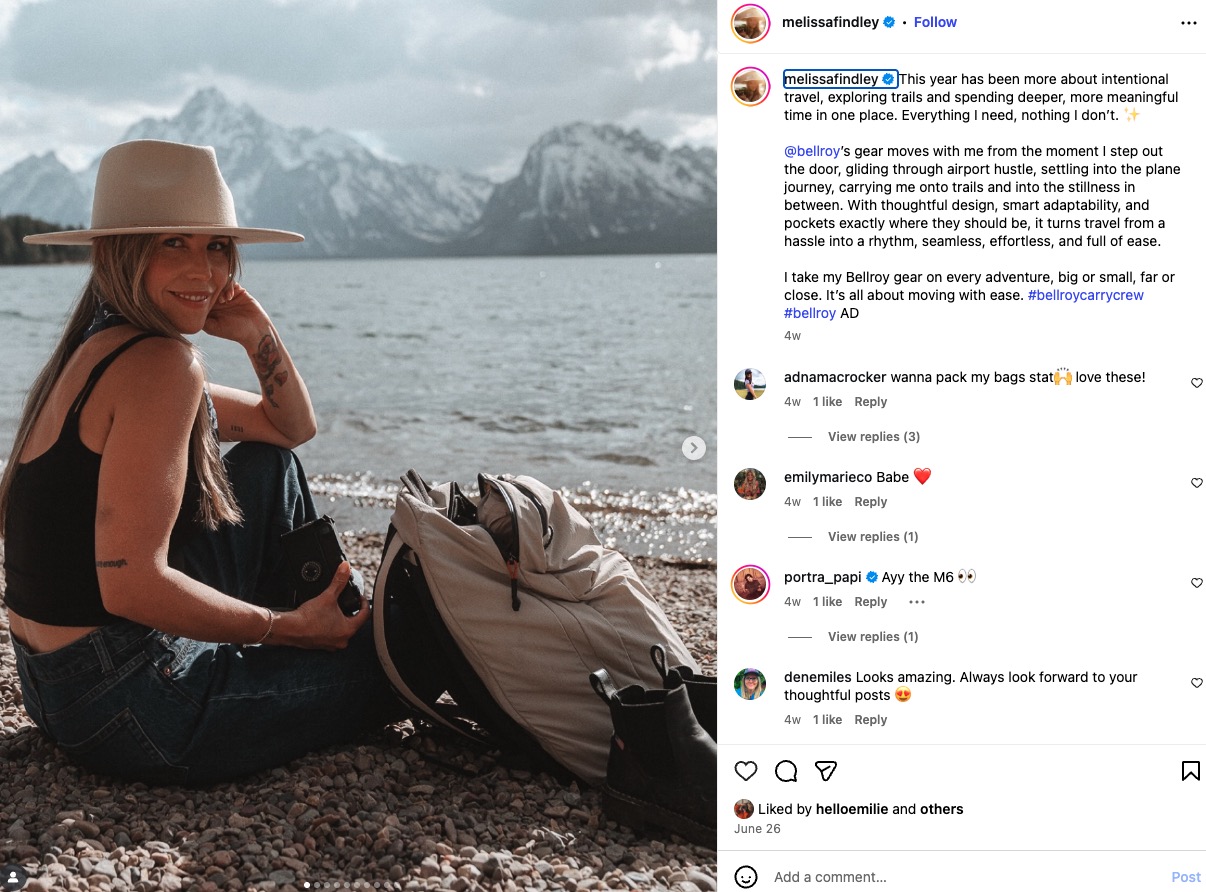
Someone planning a trip to Japan in six months will spend weeks researching the perfect luggage setup.
They'll:
When they finally buy, it's because they've seen the same product recommended multiple times.
Travel advice doesn't expire like fashion trends or tech reviews.
A packing tutorial from 2022 still teaches someone how to organize their suitcase today. You get ongoing value from a single piece of content without paying for it again.
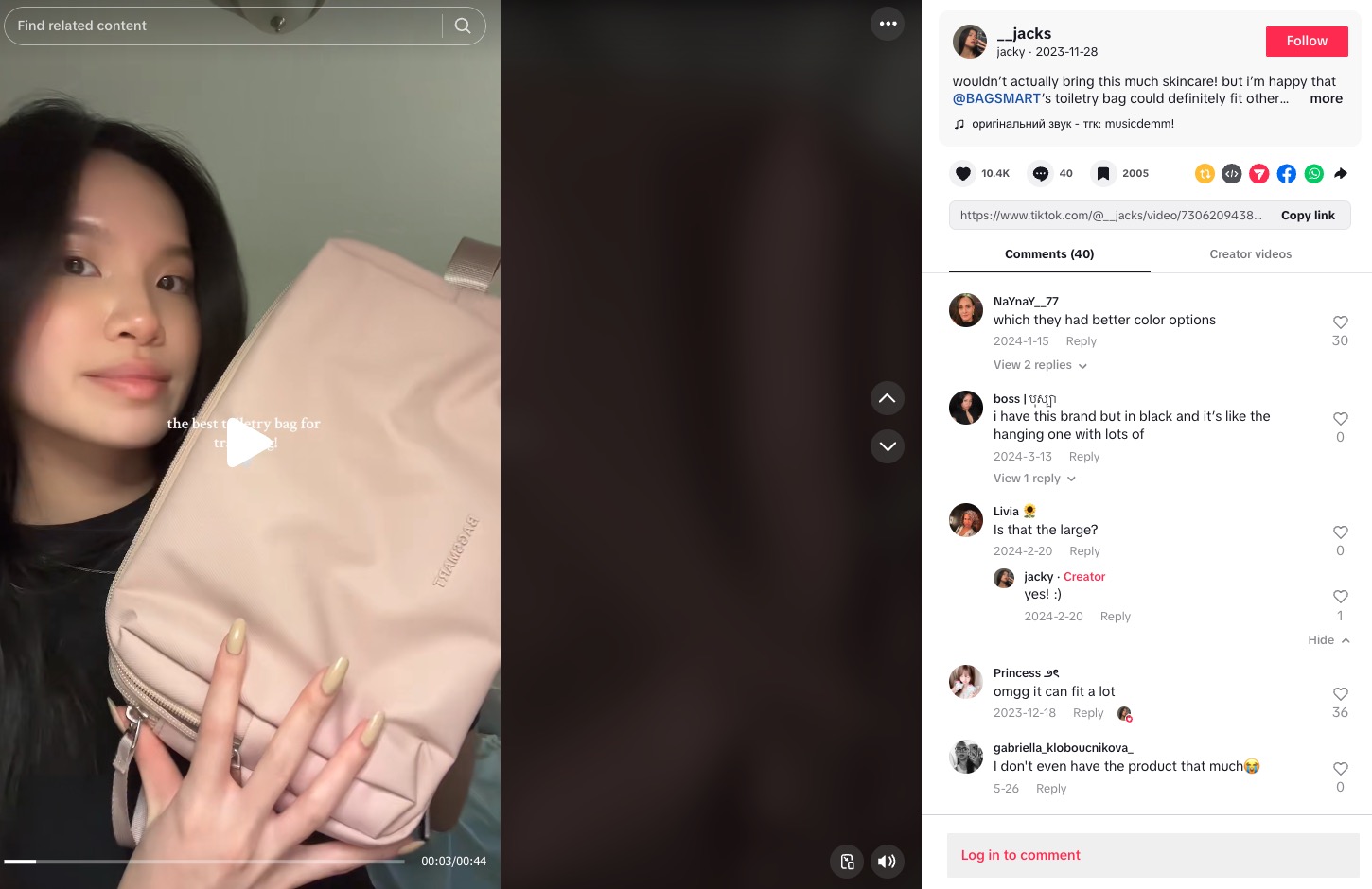
The difference between scattered influencer experiments and systematic growth is having creators who post about your brand regularly, not just once. When you build this community right, you'll have travel creators showcasing your products every week instead of hoping for occasional mentions.
The Illuminati Method is our systematic approach to get there.
It starts with low-risk product seeding to identify genuine advocates, then converts the best performers into long-term ambassadors, and finally creates custom partnerships with your top revenue drivers.
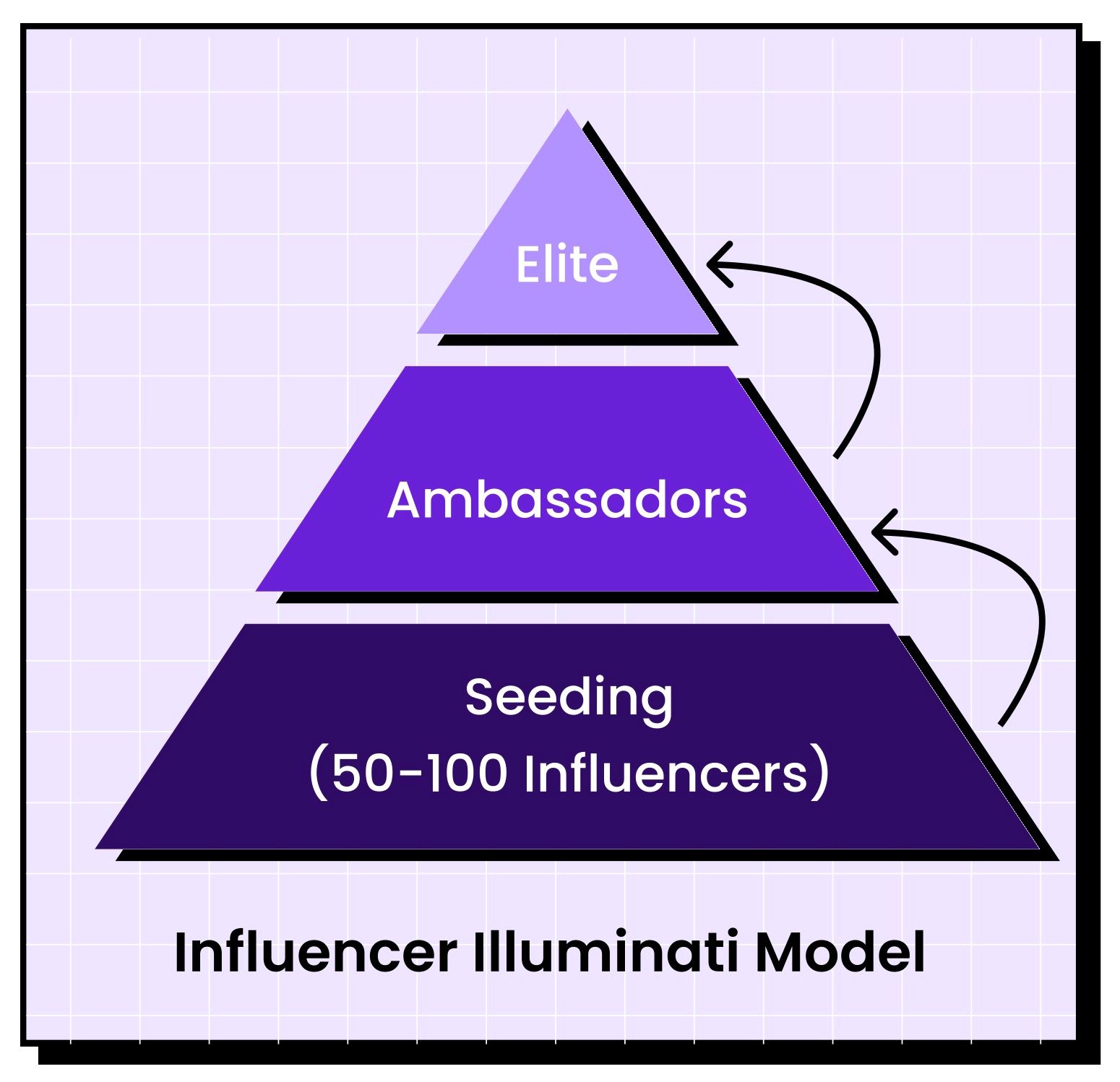
Product seeding is sending your travel products to influencers for free with no strings attached.
You include a friendly note nudging them to share the product with their audience if they love it, but there's zero obligation to post.
Most influencers you reach out to won't respond, some will respond but never follow through, others will use your product quietly, and only a small percentage will actually create content.
You need to reach out to 50-100 travel creators to get 8-10 posts.
Don't overthink this initial phase. You're testing, not committing.
Look for creators who:
Use this phase to test different influencer types and see what resonates.
You might discover that family travel influencers drive more sales for your packing cubes than solo backpackers, even though backpackers seem like the obvious fit.
Check out this guide to define who your ideal influencer can be.
You can use SARAL to find them on one platform without endless scrolling on social media.
This happens, but it's still cheaper than failed paid campaigns.
A $50 product sent to 10 influencers who don’t use it costs you $500.
A $2,000 sponsored post that generates zero sales costs you $2,000.
The math clearly favors the seeding approach for discovering genuine product-market fit with influencers.
You're identifying the small percentage who naturally align with your brand.
The influencers who post without being asked are showing you something valuable: they genuinely liked your product enough to share it with their audience.
These are your future ambassadors.
Your outreach strategy depends on creator size and communication patterns.
A three-part message structure that you can follow →
Save and share this image to remember the rules every time you send a message to an influencer 👇
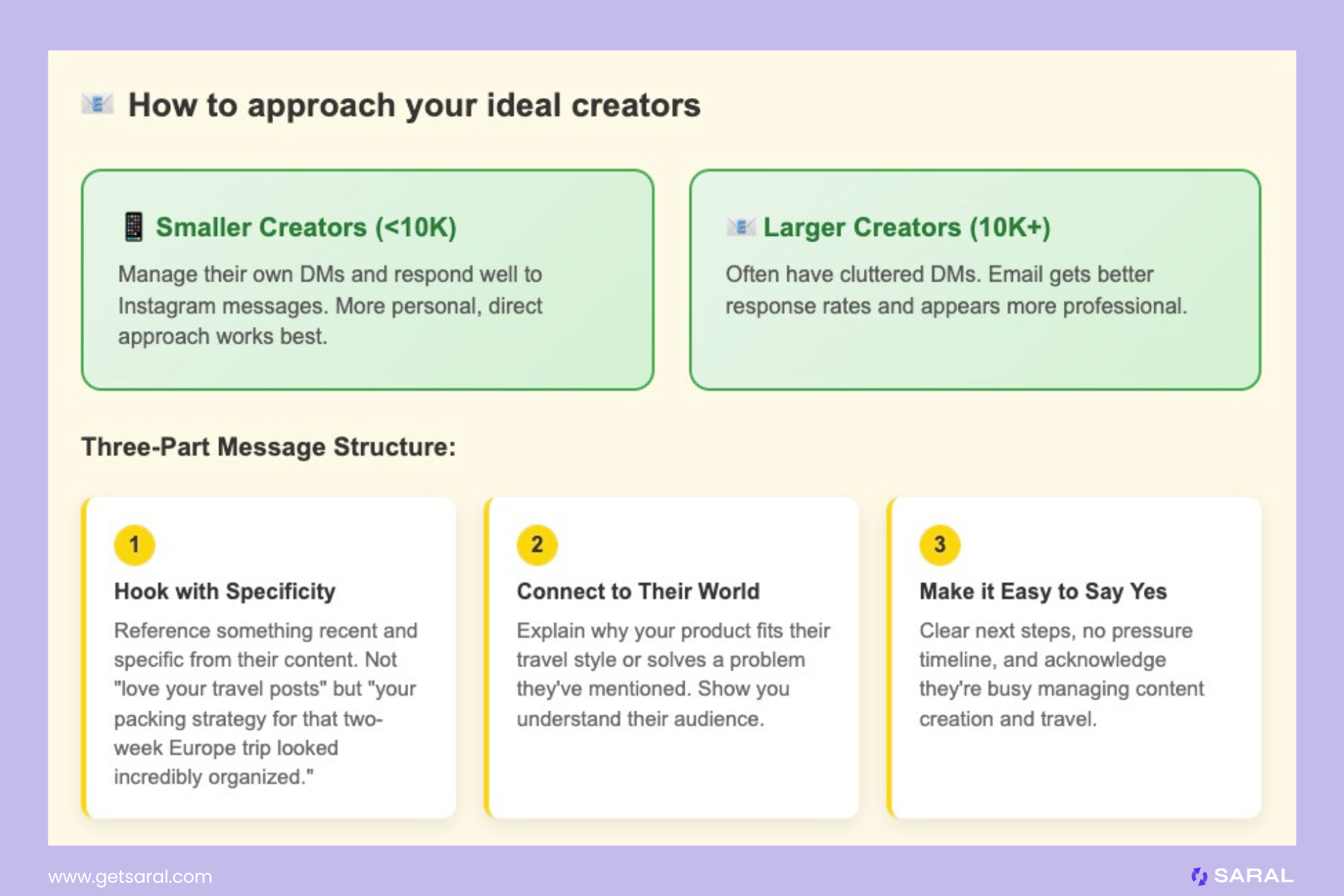
Here's a sample message you can edit according to your products:
"Hi [name], I've been following your travel content and loved your recent post about overpacking for Iceland (been there!). We make packing cubes specifically designed to help travelers stay organized without sacrificing space. Would you be interested in trying them out for your next trip? No strings attached - just think they might be useful for someone who travels as much as you do. Let me know if you'd like me to send some your way!"
The timeline for seeding success
Give creators 6-8 weeks after receiving products before evaluating results. Travel creators often batch their posting around actual trips, so someone might receive your luggage in January but not post until their March vacation.
Only invite creators who actually posted about your free products to become ambassadors. This exclusivity matters because they've already proven they genuinely like your products and will create content about them.
Create a three-part ambassador offer that benefits everyone:
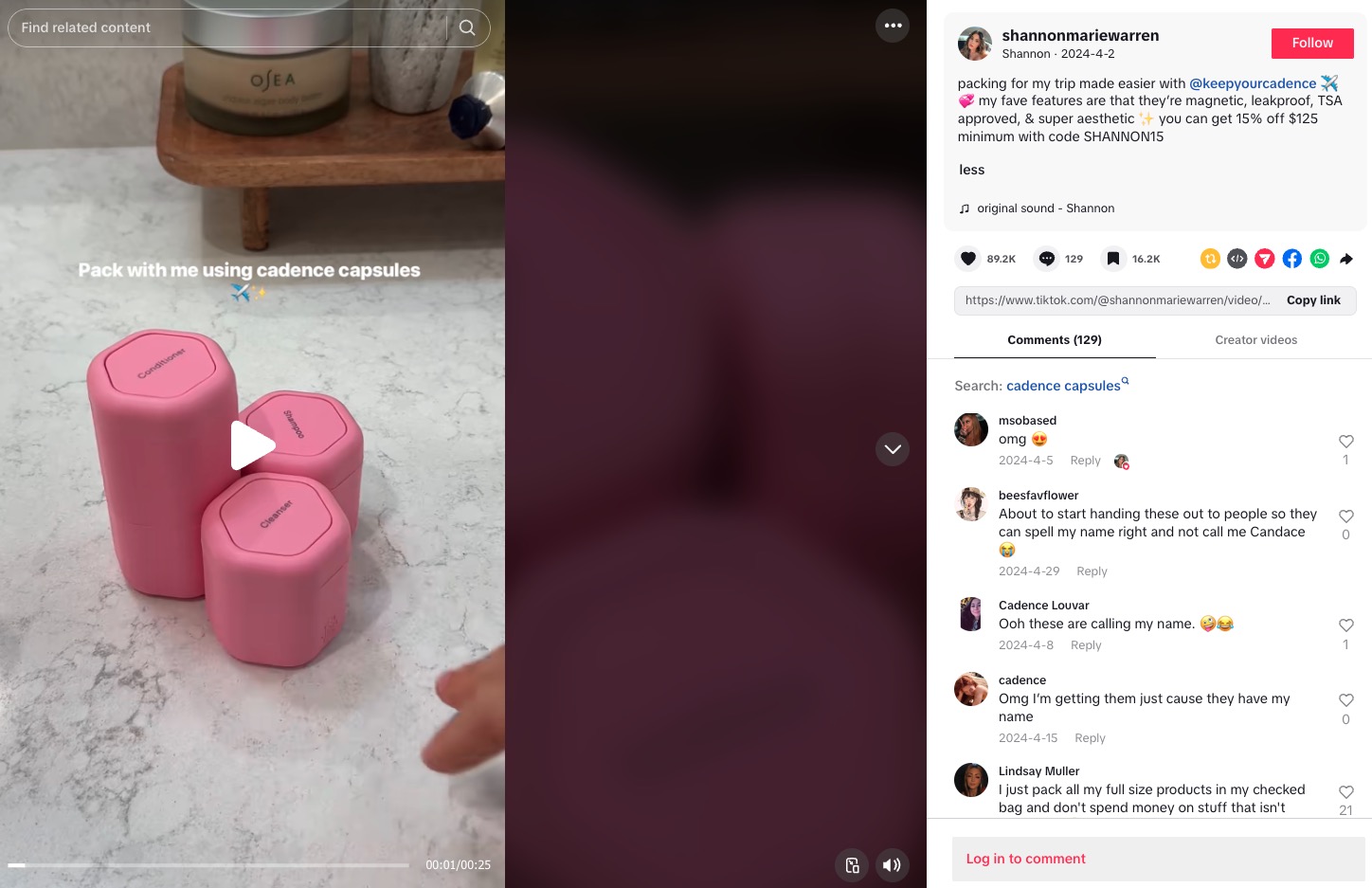
Start small with 10-15 ambassadors and prove the model works before expanding. It's better to have a manageable program that's profitable than an overwhelming one that drains resources.
Begin by understanding your profit margins. For instance, if your net margin is 65%, you have room to offer a 15% commission to influencers and a 15% discount to customers, still retaining a 35% profit margin.
Avoid Overpaying. While high commissions might attract influencers, it can make it difficult to have enough resources needed for customer retention strategies.
Contracts are essential to prevent misunderstandings and protect both parties. Don't overcomplicate the process, though. Start with a standard template you can use for all ambassadors. Here's a simple influencer marketing contract that you can copy.
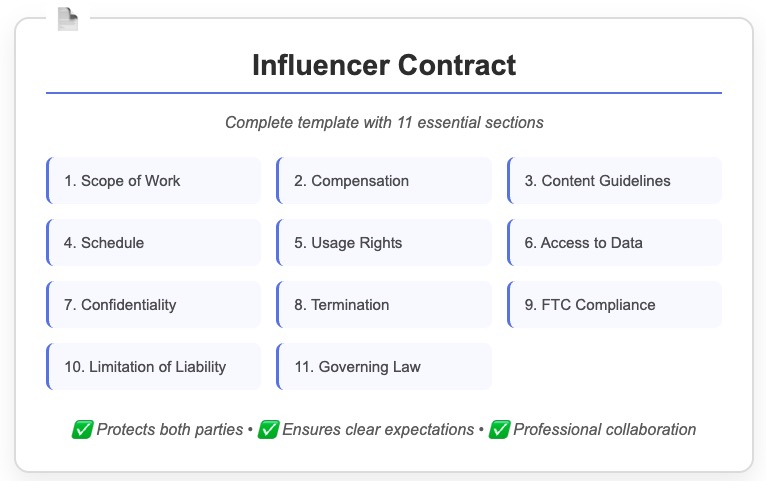
Your contract should cover key areas like commission rates and payment terms, content guidelines and brand standards, exclusivity clauses (if any), termination conditions, and intellectual property rights. This blog breaks down the essential sections to include in your influencer contracts.
It also legitimizes your program and makes ambassadors feel more confident about promoting your products.
After running your ambassador program for a few months, you'll notice the 80/20 rule in action. About 10% of your ambassadors will drive 80% of your sales. These are your goldmine creators who deserve special attention.
Track these key metrics for each ambassador:
Your "top performer" definition depends on your business goals.
→ If you need immediate cash flow, prioritize ambassadors with the highest total sales volume.
→ If you're building for long-term growth, focus on creators who bring customers with high lifetime value, even if their initial order volumes are smaller.
.png)
The goal is to identify which creators have the strongest influence over their audience's purchasing decisions. These top performers become candidates for guaranteed monthly partnerships rather than commission-only relationships.
For your best-performing ambassadors, shift from commission-only to guaranteed monthly retainers. This creates predictable income for them and guaranteed content for you.
Here's how the math works:
If an ambassador generated $5,000 in sales over three months and earned $1,000 in commissions at 20%, you can offer them $800 monthly guaranteed to create a set number of posts. They get more predictable income, and you get consistent content.
Track their historical performance to set realistic expectations. If they posted 6 times to generate those sales, asking for 8 posts monthly for the retainer is reasonable and gives you more content than their organic posting frequency.
If you follow this influencer marketing process, in just 5-6 months, in just 5-6 months, you'll have creators posting about your travel products weekly instead of hoping for random mentions.
Spreadsheets and manual processes might help you get through the initial steps, but they won't scale to the point where you see substantial returns that justify influencer marketing as a real channel worth investing in.
To properly manage ambassador relationships, track performance, automate commission payments, and scale to hundreds of creators, you need the right tools and systems in place.
👉 If you're ready to take your influencer marketing seriously and see how other travel and DTC brands have built profitable ambassador programs, let's talk. Book a demo with SARAL and we'll show you exactly how the process works, share case studies from similar brands, and demonstrate how our platform can help you scale efficiently.
How do I choose the right travel influencers for my brand?
Look beyond follower count and focus on audience alignment. Choose creators whose travel style matches your product positioning — luxury travel influencers for premium luggage, budget backpackers for practical gear. Check if their audience comments show genuine travel interest and purchasing power. Most importantly, ensure they create content that naturally showcases products in use rather than just flat lay photos.
How do I measure ROI from travel influencer campaigns?
Track unique discount codes, affiliate links, and UTM parameters to measure direct sales. Also monitor indirect metrics like brand mention increases, website traffic spikes, and social media follower growth. For travel products, factor in the long buying cycle — someone might see your luggage in January but not purchase until their summer vacation.
Can small travel brands compete with big companies for influencer partnerships?
Absolutely. Small brands often have advantages: faster decision-making, more personalized relationships, and willingness to work with emerging creators. Many influencers prefer working with smaller brands because they get better support, more creative freedom, and often become early advocates as the brand grows.
What type of content works best for travel product promotions?
Authentic, in-use content performs better than staged product shots. Think packing tutorials, airport travel vlogs, destination reviews featuring your products, and problem-solving content (like "how this backpack saved my overpacking problem"). Video content, especially on TikTok and Instagram Reels, typically generates higher engagement than static posts.
How do I identify which travel influencers will actually drive sales vs. just engagement?
Look for creators whose audiences actively ask questions about products in comments and who have previously promoted travel products with visible engagement. Test with small product seeding first — influencers who post without being asked are more likely to drive sales. Track not just clicks but actual conversions, and pay attention to the quality of questions their audience asks about your products.
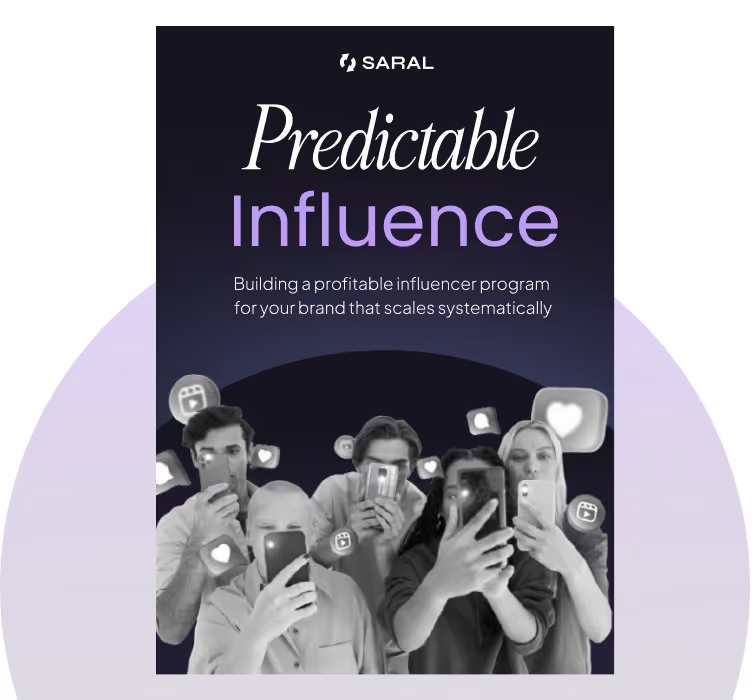
Sign up for a 7-day email course on the unique "Predictable Influence" strategy used by top brands like Grüns, Obvi, Tabs Chocolate.

If ditching the randomness of influencer campaigns and building a predictable, ROI-first influencer program sounds like a plan. Consider talking to our team!